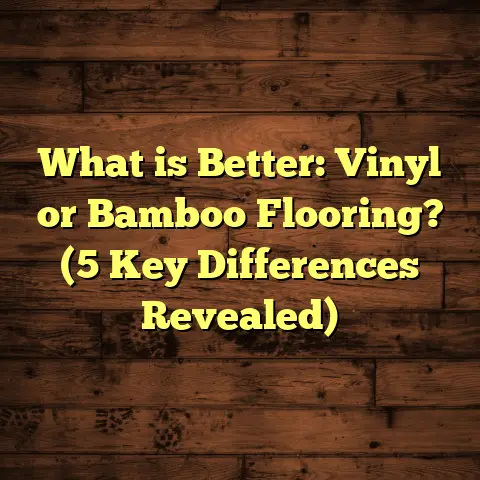What is SPC Vinyl Flooring? (5 Key Benefits for Homeowners)
I remember one afternoon when I was working on a kitchen renovation for a family with three kids. They wanted something tough yet beautiful — a floor that could survive spills, dropped plates, and muddy shoes without losing its charm. We settled on SPC vinyl flooring, and the transformation was remarkable. Months later, they told me how amazed they were that their floor still looked pristine despite the chaos of daily life. That’s what makes SPC vinyl flooring stand out for many homeowners today.
What Is SPC Vinyl Flooring?
SPC vinyl flooring — or Stone Plastic Composite flooring — is a type of rigid core vinyl flooring. It’s made by combining limestone powder, polyvinyl chloride (PVC), and stabilizers to create a dense core layer. This core gives SPC flooring its exceptional strength and stability.
Unlike traditional vinyl sheets or luxury vinyl planks (LVP) that have softer cores, SPC’s rigid core is what makes it resistant to dents, warping, and impacts. Think of it as a hybrid between the durability of tile or stone and the comfort and flexibility of vinyl.
The construction layers generally look like this:
- Wear Layer: The topmost protective coating that guards against scratches, stains, and fading.
- Design Layer: A high-resolution printed layer that mimics textures such as wood grain, stone, or tile patterns.
- SPC Core Layer: The heart of the product — a dense composite of limestone powder and PVC that provides rigidity.
- Backing Layer: Provides balance, stability, and sometimes sound insulation.
This unique makeup means SPC flooring is 100% waterproof, incredibly durable, and looks natural enough to fool most visitors into thinking it’s real hardwood or stone.
I’ve installed dozens of SPC floors in homes ranging from busy urban apartments to sprawling family houses. One thing they all had in common was the need for a floor that could handle life — not just look good in a photo shoot.
1. Durability That Stands the Test of Time
Durability is often the first question homeowners ask me when we discuss floors. “How long will it last? Will it scratch or crack?” Those are fair concerns because floors are a big investment.
SPC vinyl flooring answers these questions well because its limestone composite core makes it incredibly resilient. It’s hard enough to resist dents from dropped objects, furniture movement, or pet claws but still flexible enough to avoid cracking under pressure.
Real-world durability test
On one project, I installed SPC flooring in a family room where the kids often played rough with toys and pets. After two years, the floor showed almost no wear or dents despite heavy use.
Industry data backs this up too:
- SPC floors can withstand indentation forces up to 1,500 psi (pounds per square inch).
- Traditional vinyl floors generally withstand around 700 psi.
- Hardwood floors vary widely but often dent from as little as 1,000 psi depending on species.
This means SPC flooring outperforms many popular alternatives when it comes to resisting damage.
Scratch resistance
The wear layer on SPC floors is designed to resist scratches from everyday use. I’ve seen floors survive scratches from dog nails and grit tracked in from outside without showing marks. This is especially important for families with pets or kids who aren’t always gentle on floors.
Impact resistance
SPC flooring can handle impacts better than laminate or hardwood because its composite core distributes force evenly instead of cracking under pressure.
Anecdote: I visited a home where a heavy iron pot fell off the counter onto the floor. Instead of cracking or chipping, the floor absorbed the impact with barely any mark.
Longevity
Compared to traditional vinyl that may need replacement every 8-10 years due to wear or damage, SPC floors often come with 20+ year warranties and maintain their look much longer.
2. Water Resistance That Keeps Your Home Safe
Water damage is one of the most common reasons homeowners replace floors. Hardwood warps and swells, carpets get moldy, and even tile grout can discolor over time.
SPC vinyl flooring offers peace of mind because it’s completely waterproof. The dense composite core doesn’t absorb moisture like wood or laminate does.
Why waterproof matters
If you’ve ever spilled water on hardwood or laminate floors, you know how quickly they can suffer damage. Even small leaks under sinks or in bathrooms can cause warping or buckling over time.
SPC floors solve this by being impervious to water:
- No swelling or warping after exposure
- Mold and mildew resistant due to no water absorption
- Suitable for wet areas like bathrooms, kitchens, basements, laundry rooms
My experience with water resistance
I installed SPC flooring in an older home’s basement that had moisture issues before. After eight months of use, including occasional flooding during heavy rainstorms, the floor remained flawless with no signs of water damage.
A study by the Resilient Floor Covering Institute shows SPC floors resist water absorption even after 72 hours submerged in water — something no wood-based floor can claim.
Practical benefits
This means you won’t have to worry about accidental spills ruining your floor or costly repairs from minor leaks. Plus, cleaning is safer since you can mop without fear of water damage.
3. Easy Installation That Saves You Time and Money
If you’ve ever watched a home renovation show where they spend days just installing flooring, you know how time-consuming traditional options can be.
SPC vinyl flooring is designed for fast installation thanks to its click-lock system:
- No glue needed
- No nails or staples required
- Planks snap together tightly for a floating floor installation
Why this matters for homeowners
If you’re tackling a DIY project on weekends or want to keep labor costs low with contractors who work efficiently — SPC makes the process easier.
My story: fast installation saves the day
I once helped a homeowner who needed new flooring before a big family event. We installed over 1,000 square feet of SPC flooring in just two days with a small crew — something impossible with hardwood or tile given the timeline.
Subfloor flexibility
Another advantage: SPC can be installed over many existing surfaces like concrete slabs or old tiles without expensive removal work. This reduces prep time and cost further.
Tip: Make sure your subfloor is clean and relatively level for best results.
4. Design Versatility That Matches Any Style
I love that SPC offers beauty alongside durability. When I first saw some of the newer designs mimicking natural hardwood grains or stone tiles from a few feet away, I had to do a double take — they looked so real!
Variety of styles
Whether you want classic oak tones for cozy living rooms or sleek slate looks for modern kitchens, SPC has options:
- Wood-grain patterns with embossed textures
- Stone-look tiles with realistic veining
- Patterned tiles mimicking ceramic or porcelain
This versatility means you don’t have to compromise style for function.
A statistic worth noting
Global demand for wood-look SPC products has grown by about 15% annually over the past five years according to market research reports — showing how popular these designs have become.
Customization options
Some brands also offer different plank widths and lengths or mixed colors for unique layouts. This flexibility lets you create floors that fit your exact aesthetic preferences.
Personal favorite design stories
One client wanted a weathered barnwood look for their dining room but needed waterproofing due to nearby kitchen use. SPC provided exactly what they wanted, combining rustic charm with modern performance.
5. Low Maintenance That Fits Your Busy Life
If you dread cleaning floors after long days or weekends filled with activities, SPC vinyl flooring might be your best friend.
Simple cleaning routine
Because SPC is waterproof and resistant to stains:
- Regular sweeping removes dirt and grit
- Occasional mopping with mild soap keeps it fresh
- No special cleaners needed
- No waxing or refinishing required
Real-life example
A mom I worked with told me she loved her new SPC floor because she could quickly mop up juice spills from her toddler without worrying about permanent stains.
Durability meets easy care
This combination means your floor keeps looking new longer without expensive maintenance efforts or special products.
Extra Tips From My Floor Installations
After installing many SPC projects, here are some things I learned that might help you avoid common pitfalls:
Prepare your subfloor carefully
Even though SPC tolerates unevenness better than hardwood, prepping your subfloor properly prevents future issues like uneven wear or noise.
Sound insulation matters
If noise is a concern (like apartments or multi-story homes), look for SPC products with attached underlayment that reduce footsteps sounds.
Watch temperature changes
While SPC has great stability compared to wood, extreme temperature swings might cause slight expansion/contraction. Leaving gaps around edges during installation handles this easily.
Warranty considerations
Many manufacturers offer warranties from 10 up to 25 years. Always check warranty terms and customer reviews before buying.
Addressing Common Questions About SPC Flooring
Can I install SPC over existing floors?
Yes! It’s often installed over concrete slabs, tile, or even hardwood if conditions are right — saving demolition costs.
How does it compare cost-wise?
Installed costs usually range $3-$7 per square foot depending on brand and region — more affordable than many hardwoods but slightly higher than basic vinyl sheets.
Is it safe for pet owners?
Absolutely! Scratch resistance and waterproof properties make it ideal for homes with pets.
Does it feel cold underfoot?
SPC can be cooler than wood but adding area rugs or radiant heating underneath can improve comfort.
Diving Deeper: The Science Behind SPC’s Strength
To appreciate why SPC vinyl flooring is so durable, let’s look at what goes into its core material:
- Limestone powder makes up about 60-70% of the core by weight. This mineral component offers rigidity and compressive strength.
- Polyvinyl chloride (PVC) acts as a binding agent providing flexibility.
- Stabilizers ensure consistent performance under heat and pressure during manufacturing.
The manufacturing process involves high pressure molding which fuses these components into a dense sheet that resists bending, dents, and moisture penetration better than traditional vinyl composites that use foam cores.
In lab tests measuring resistance to indentation and impact forces:
- SPC cores show approximately twice the hardness compared to WPC (Wood Plastic Composite) vinyl cores.
- Wear layers are tested for abrasion resistance using standardized methods like Taber testing; high-quality SPC floors have wear layers rated above 20 mils thickness (0.5 mm), ensuring long-lasting surface protection.
Real Case Studies From My Work With Homeowners
Case Study 1: The Busy Family Kitchen Rescue
The Johnson family had hardwood floors that warped badly after repeated spills in their kitchen. They wanted something durable but warm-looking. After evaluating options, we chose an oak-look SPC floor with a thick wear layer.
Result: After two years of heavy cooking and kids’ messes, the floor remains unscathed, easy to clean, and beautiful — exactly what they hoped for.
Case Study 2: Basement Renovation in a Humid Climate
In Florida’s humid environment, basements are prone to moisture issues. The Smiths wanted a moisture-proof floor that could handle occasional flooding without mold problems. We installed slate-look SPC planks with attached soundproofing underlayment.
Result: The basement now feels cozy and dry even after heavy storms; no mold concerns so far; easy cleanup after minor floods.
How To Choose The Right SPC Flooring For Your Home
When shopping for SPC flooring consider:
- Wear layer thickness: Aim for at least 12 mils (0.3 mm) for homes; thicker for commercial use.
- Core thickness: Usually ranges from 4mm to 8mm; thicker cores provide better comfort and durability.
- Design: Pick patterns/textures matching your style.
- Underlayment: Some come pre-attached; others require separate purchase.
- Warranty: Longer warranties generally reflect better quality products.
- Brand reputation: Read reviews and ask installers about experience with specific lines.
Final Thoughts From My Flooring Journey
Over my years working in flooring installation and consulting homeowners directly, I’ve seen trends come and go. But few materials combine performance with style as effectively as SPC vinyl flooring does right now.
It’s durable enough for demanding households yet stylish enough to satisfy design lovers. Water-resistant so you don’t stress about spills. Easy enough to install yourself if you’re handy but fast enough for pros too. Plus simple care means less hassle long term.
If you want a floor that holds up while looking great without breaking your budget — consider giving SPC vinyl flooring a closer look. If you want help choosing products or tips on installation based on your home’s needs, just ask!





